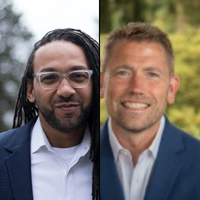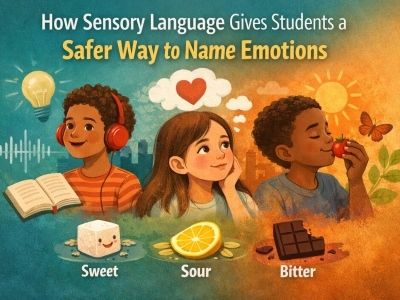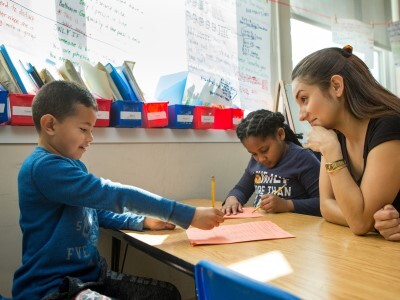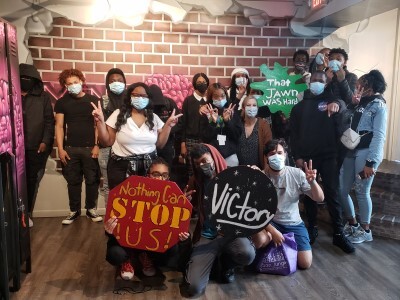Building the Bridge through Courageous Conversations: An Interview with Shomari Jones and Paul Sutton
Topics
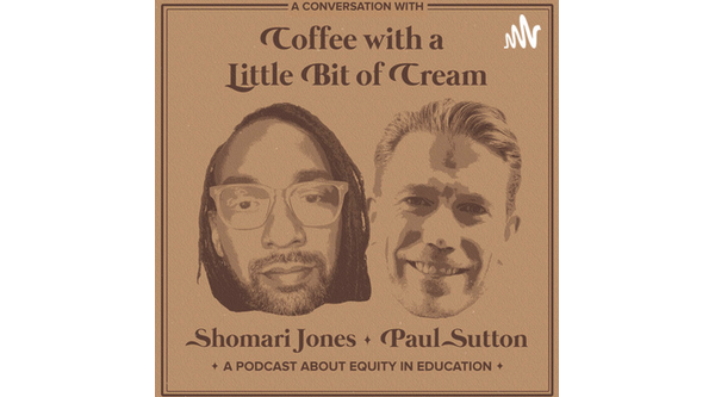
Together, educators are doing the reimagining and reinvention work necessary to make true educational equity possible. Student-centered learning advances equity when it values social and emotional growth alongside academic achievement, takes a cultural lens on strengths and competencies, and equips students with the power and skills to address injustice in their schools and communities.
Educational equity leaders (and podcast hosts) Shomari Jones and Paul Sutton examine courageous conversations, what they are, why they are important, and how to have them.
Could you introduce yourselves?
Shomari: Sure! I'm Shomari Jones. I am the director of equity and strategic engagement for the Bellevue School District [Washington].
Paul: I'm Paul Sutton. I'm associate professor of education at Pacific Lutheran University [Washington].
How did you meet and start working with each other?
Paul: I've been working with Shomari for several years now. We work on various projects together, but mostly, the thing that we do together is this podcast, this little project that we started. Coming out of COVID, we started having conversations with each other just about stuff that we are noticing and just issues that were surfacing, and so we decided to start recording it. That turned into this podcast that we have called Coffee with a Little Bit of Cream, which is Shomari and I talking about all things related to equity and education; we bring on guests, and it's fun.
Could you talk about your work around engaging in courageous conversations? What are they?
Shomari: Courageous conversations are opportunities for us to engage with each other, seeking opportunities and ways to learn and grow within ourselves and within relation to one another. We start with this compass.

Credit: Creative Conversations about Race: A Field Guide for Achieving Equity in Schools and Beyond by Glenn E. Singleton
The compass in and of itself is just a tool that we utilize to express that sometimes when we come to the table, we're coming to the table from a different space than the person who we may be engaging with. And we really boiled this down to four spaces in which you traditionally come from. You don't have to only come from one specific space. You can have a couple of different spaces that you react to immediately. But most often we gravitate to one. So for example, I tend—specifically, when engaging in conversations that are complicated—I tend to show up a lot of times in my emotional space. After some practicing, Paul, I’m actually seeing that I no longer hardcore die in the emotional space. It's interesting to see how I've progressed through my continual practice. Instead of landing in emotions, we want to evaluate and assess where you are in each one of these categories so that you can be centered. Because centered is a way that we will most achieve opportunities to build bridges and build relationships with other individuals.
And so just looking around the compass, oftentimes we either fall into the feeling or the emotional quadrant, the believing or the moral quadrant, the thinking or the intellectual quadrant, and the acting or the relational quadrant. And there's nothing wrong with any of them. We want you to experience all of them, but just note this example from my personal experience:
I was in conflict with the community in which I serve around building a body of work, specifically equity, that I thought was really important to the success of our students. This particular part of the community was not in agreement with what my beliefs are. They were operating from and coming to the conversation in their feelings quadrant. I was operating from and coming to the conversation in my head or in my thinking/intellectual quadrant. And when we engaged in discussion, we were not seeing eye-to-eye. We were planes crossing in the air, without having any opportunity to build relationships or build bridges.
So, what would have been best served for me is to maybe show up in my thinking and take time to think about my beliefs a little bit, then explore my emotional quadrant, and then proceed to my action quadrant. Because if I’m seeking to transform someone else's belief, I need to meet them where they are.
Paul: Courageous conversations really revolve around coming to the table with people who think differently than you, revealing needs, shining light on fears, identifying preconceived beliefs or understandings, and spending time building a pathway to better comprehend each other’s perspectives, creating an atmosphere of patient listening that blends the elements of mercy and truth. I really want to know where you're coming from and why you're coming from there as much as I want you to know where I'm coming from and why I'm coming from there.
The goals of courageous conversations are to:
- Gain wisdom to see from a bigger perspective.
- Gain understanding that will help establish truth in relationships.
- Build bonds and bridges, and a lot of times, cross-sectional with individuals who may not come to the table believing what we believe.
Ultimately, if we continue to share or shirk our responsibility to involve all different perspectives and all different voices, we will not be moving together.
Shomari: These conversations can sometimes be challenging, and they can sometimes be revealing and make us vulnerable, so these three guidelines kind of provide us with some rules or norms about how we can be in that space:
- Stay engaged.
- Be authentic by sharing honest feelings.
- Maintain confidentiality.
Remember these five anchors to take care of yourself during difficult times in courageous conversations:
- Quiet your mind.
- Notice the sensations, the vibrations. What's going on in your body?
- Accept the discomfort.
- Stay present.
- Safely discharge the energy that remains.
Paul: I hope that folks who are reading this just find some small part of their life to lean in and just give it a go and see what happens. Enjoy the wallowing and enjoy the awkwardness and know that every time you do that, you just get a little bit better at it.
Shomari: Yes, that's awesome, Paul. To gain wisdom to see from a bigger perspective, I involve myself in conversations with others, especially those who I don't see eye to eye with for a multitude of reasons. I was told once that I am not going to be ever capable of changing who you are. You have to change who you are. I can provide you with a perspective. I can take you on a journey alongside me. I can show you the way, but until you make the decision that you are going to be the one who changes for you, it just won't happen. And so to gain wisdom, to see from a bigger perspective—to me, [this] involves me walking and taking a journey with you to a place where we can both come to an understanding and an agreement. And I want to gain some understanding that will establish trust in the relationship; relationships are built on trust. That trust is going to allow me to continue to come back to the conversation with you.
Because of that established relationship, I can pause and not be salty [laughing]. And start off from a space of listening and then engaging, which would help to lead to a quicker bridge to the other side and to gain knowledge so that you can take the next steps, right?
I want to encourage you all who have the opportunity to read this, to reach out to us if you want to practice, to find pathways to try this and practice this at home with your loved ones or with—let's not try it on your boss first. Let's practice a couple of times before you take it off, and then suddenly, you don’t have a job anymore [laughter]. Let's practice in some spaces where you feel the least amount of negative impact as possible so that you can continue to build up that courage to engage in courageous conversations.
Podcast graphic courtesy of the authors.

